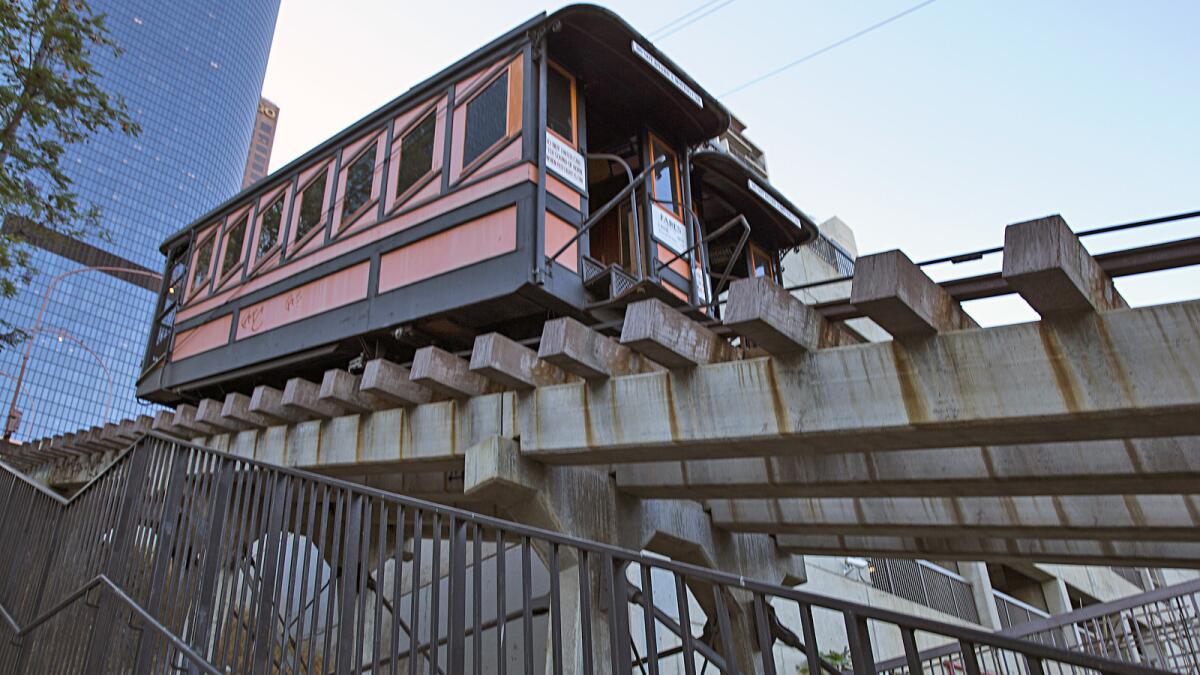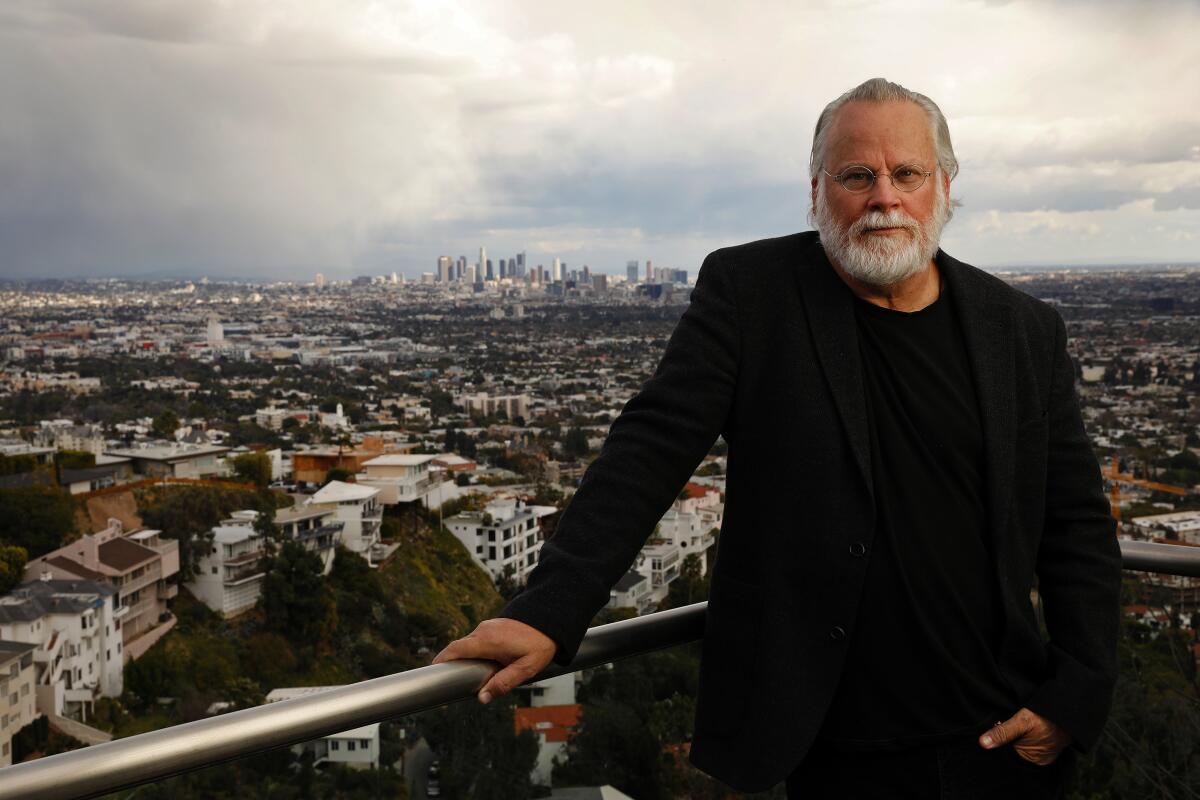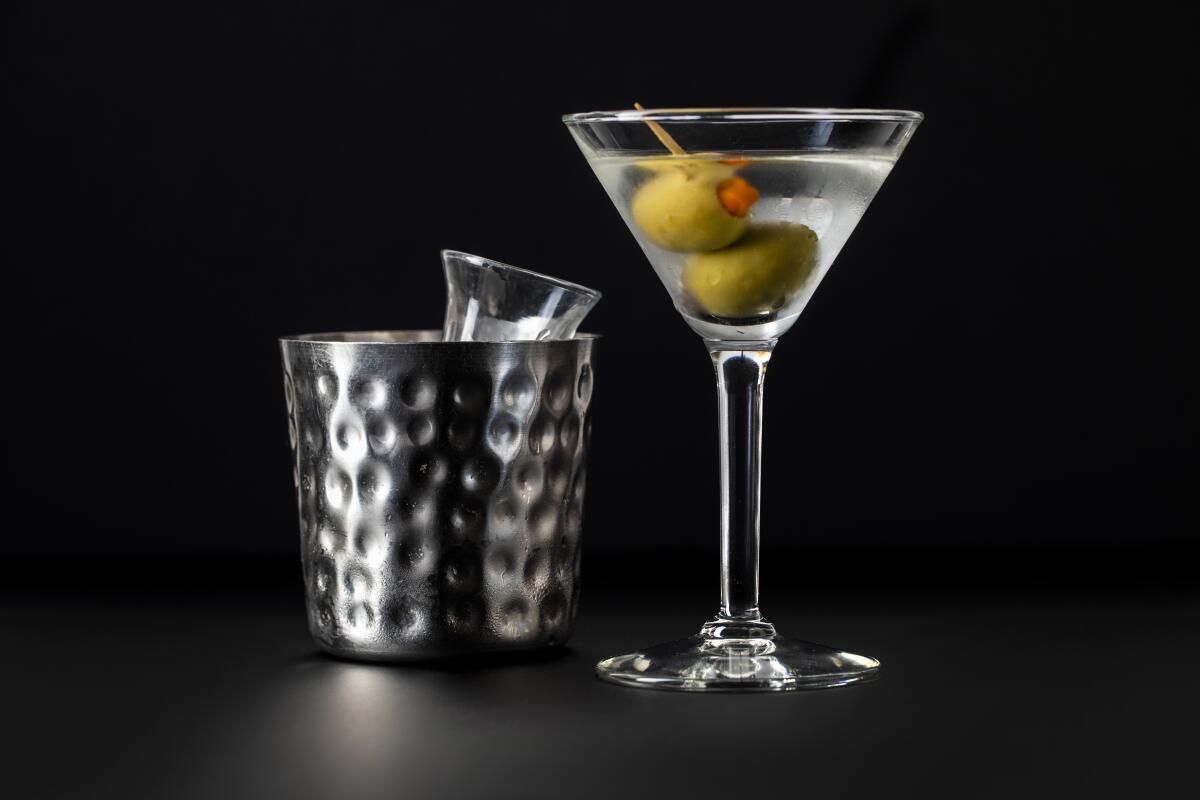The 15 most iconic Harry Bosch haunts across L.A.
While Joan Didion, Raymond Chandler and Charles Bukowski long have been credited as the city’s literary sages, nobody captures modern L.A. better than Michael Connelly.
In more than 30 crime novels across the last three decades, Connelly employs a keen journalistic eye to search out telling detail and descriptive color from the city’s streets.
For the record:
2:14 p.m. Oct. 21, 2019An earlier version of this article said that the downtown Los Angeles mural of actor Anthony Quinn was painted in 1961. It was painted in 1985.
Most of these explorations come through the eyes of Connelly’s knight errant, Hieronymus “Harry” Bosch, a relentless detective whose motto — quoted on a conference room wall in LAPD’s real headquarters — is “Everybody Counts or Nobody Counts.”
On the page and in five seasons of the “Bosch” TV series, Connelly focuses on downtown and Hollywood, in settings with more grit than glamour. His fictional detective lives in a home high atop the Hollywood Hills and returns again and again to favorite haunts throughout the best-selling series, which continues with the publication of “The Night Fire” on Tuesday.
Here’s a tour of Harry Bosch’s Los Angeles.
Angels Flight (1)
Built in 1901, the downtown landmark Angels Flight is a funicular ferrying pedestrians 298 feet up and down Bunker Hill. The inclined railway is also the title of a 1999 novel in which Bosch investigates the murder of a prominent attorney and another passenger gunned down in one of the tiny cars. The brief ride itself is much more benign, a $2 round trip on cozy benches in herky-jerky cars from another era. The only mystery is why — in a town bleeding Dodger blue — are these cars painted orange and black, colors of the rival San Francisco Giants?

The Bradbury Building (2,3)
A block away from Angels Flight is the famed Bradbury Building, built in 1893 and the oldest commercial building standing in central downtown Los Angeles. The place appears in four Bosch novels, including the debut 1992 book, “The Black Echo.” The Bradbury’s five-story Victorian court, flooded with light from its skylight, with its iron railings and interlocking walkways and staircases, remains an architectural marvel and gem to briefly explore.
Across from the Bradbury’s east entrance is a massive mural known as “The Pope of Broadway,” which captures Bosch’s gaze in a few of the books. This towering image of actor Anthony Quinn was painted on the back of a clothier’s building in 1985; artist Eloy Torrez repainted the colors in 2017. The image captures Quinn with gaze averted, arms extended and his left heel elevated, clearly about to break into dance.
Dodger Stadium (4)
Near downtown is Bosch’s place of worship: Dodger Stadium. While he’s usually too busy for a game while working a case, story after story conveys the detective’s affection for the place and his team. Bosch’s favorite Dodger isn’t a player but beloved sportscaster Vin Scully, who called more than 10,000 games. In “The Crossing,” Bosch reflects: “There was no voice as iconic or synonymous with Los Angeles as his.” In the novel, Bosch repeatedly evokes Scully and his familiar “The deuces are wild!” commentary as he builds a case against a pair of rogue vice cops. In 2016, Scully announced his retirement. Later that year Connelly dedicated “The Wrong Side of Goodbye” to him.

Nickel Diner (5)
Bosch’s downtown meals of choice are served at the Nickel Diner. This long narrow lunchroom is wrapped by a running U-shape of red leather high-back booths. Bosch orders the BLT here; it comes with avocado and a peppy aioli. When Bosch informs daughter Maddie during an episode of the TV show that Nickel has “the best chocolate shake in town” he likely is referring to the spicy Oaxaca chocolate that elevates this treat.
Code 7 on the Go (6,7,8,9)
Code 7 — the on-duty request for a meal break — knits together LAPD street cops. Eating on the run leads them to stake out favorite quick food spots. For hot dogs, Bosch has frequented Pink’s, a Hollywood landmark since 1939. When it comes to the city’s rival French dip sandwiches, he appears equally at home at Cole’s French Dip and Philippe The Original. In the new novel, “The Night Fire,” Bosch heads to the Little Jewel in Chinatown for Cajun po’boys with his half-brother, attorney Mickey Haller, now that a favorite lunch spot at Union Station has closed down.
El Matador (10)
As for street food in its purest form, Bosch says in “The Drop” that his favorite taco truck is El Matador. In real life, the truck sets up nightly from about sunset to 4 a.m. in an auto body shop parking lot at Western and Lexington in East Hollywood, abutting the 101. Fit-in-your-palm-size soft tacos with beef and pork cuts are $1.50. There are no seats in sight; eating off a napkin while leaning against the hood of a parked car is the style here. Bosch can’t say why, but, “These places all taste better after dark.”
Du-par’s (11)
Another Bosch perennial is Du-par’s at the Farmers Market. This elevated diner fare spot is open a cop-friendly 24 hours, 7 days a week. Begun as a nine-table stall in 1938, Du-par’s is renowned for buttermilk hotcakes; the specialty is the single, plate-size cake served counterintuitively with syrup underneath it. In “The Closers,” Bosch notes: “Pancakes were the perfect surveillance food … filling the stomach all night.”
Musso & Frank Grill (12)
Bosch’s favorite meal in L.A., however, is Musso & Frank Grill, Hollywood’s oldest restaurant, celebrating its 100th anniversary this year. The high-ceilinged rooms are a cloth-napkin, stirred-martini and American comfort food shrine. Bosch favors Thursday’s special, chicken pot pie with a side of creamed spinach. But in “The Night Fire” he discusses a case with new LAPD partner Renée Ballard over the lightly breaded sand dabs and “sourdough bread … the best south of San Francisco.” Bosch’s cocktail of choice here is a dirty vodka martini; it comes with a frosty sidecar.

The Record Parlour (13)
Jazz is Bosch’s passion. In almost every book the detective immerses in America’s most original art form. In “The Night Fire,” Bosch is at home, delving into the paperwork from a cold case and plays a live Charles Mingus album, dialing up a 24-minute track from the jazz bass player because it “was up-tempo, high energy and largely improvisational, and just what Bosch needed for wading through case reports.”
To feed this passion for classic jazz vinyl, largely from major talent in the ’50s and ’60s, Bosch has discovered the Record Parlour in Hollywood. With more than 15,000 platters — including more than 30 large wood crates given over to jazz LPs — the record store is walking distance from Musso & Frank’s. According to a recent Connelly tweet, Bosch introduces Maddie to the airy throwback record store in the upcoming Season 6 of “Bosch.”
Jazz Clubs (14,15)
Through the books, Bosch also haunts jazz clubs for a live fix from local players. While working from the Hollywood precinct, Bosch would hit the Catalina Jazz Club (previously the Catalina Bar & Grill) on Sunset Boulevard. The spacious room, with a long stage and a couple dozen tables for four, hosts a mix of local and name talent most nights of the week.
Downtown, Bosch likes sets at the cloistered bluewhale club, a no-cover-charge hideaway tucked into an upstairs corner of the three-story Weller Court in the heart of Little Tokyo.
Smith is an Orange County-based writer and editor who has read every Bosch novel.
If You Go
The Los Angeles Times Book Club welcomes Michael Connelly, a former Times reporter turned bestselling novelist, to debut “The Night Fire.” He’ll be in conversation with Times reporter and novelist Jeffrey Fleishman.
What: Connelly’s latest crime novel involves a cold case murder file discovered upon the death of Harry Bosch’s LAPD mentor and a mystery surrounding a homeless man burned to death in his tent. Bosch teams up again with detective Renée Ballard.
When: 7:30 p.m. Oct. 21
Where: The Montalbán Theater, 1615 Vine St., Los Angeles.
Info: latimes.com/bookclub
More to Read
Sign up for our Book Club newsletter
Get the latest news, events and more from the Los Angeles Times Book Club, and help us get L.A. reading and talking.
You may occasionally receive promotional content from the Los Angeles Times.







